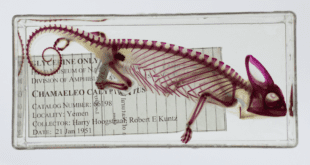The Magic School Bus: Exploring the History of Multimedia Science Education
A Virginia Tech professor, Matthew Wisnioski, will soon unveil the magic behind one of the nation’s most enduring science education series. Wisnioski, an associate professor in Virginia Tech’s Department of Science, Technology, and Society, is receiving a national grant to explore the history of “The Magic School Bus” and to better understand how multimedia, educational entertainment experiments transformed American science education.
Michael J. Meindl, associate professor in Radford University’s School of Communication, is a co-principal investigator for the project and is also receiving funding. Meindl is also a Ph.D. student in Virginia Tech’s Department of Science, Technology, and Society.
“The Magic School Bus” debuted as a book series in 1986 and quickly grew into a multimedia enterprise, including a television series, museum exhibits, toys, and more. The show ran for four seasons between 1994-97. Reflecting on the show’s 30-year anniversary, Wisnioski said the show tapped into children’s “inherent sense of wonder” and “presented a model of learning through experience that was inclusive and inquiry based.”
Wisnioski and Meindl will examine archival research and media content. Additionally, they will conduct interviews with the series’ writers and producers, science experts, animators, and game creators.
The Project Details
The National Science Foundation’s Division of Social and Economic Science will award Virginia Tech $147,638 over the next two years for the project. This collaboration with Radford University will receive $170,372. The award is cofounded by the National Science Foundation’s Advancing Informal STEM Learning program, which supports research projects that investigate the development, use, and impact of science multimedia for young children.
Goals of the Project
“Our primary goal is to explore how and why ‘The Magic School Bus’ worked – creatively, educationally, and financially,” Wisnioski said. “But we also want to understand what it tells us about the broader challenges, opportunities, and pitfalls of innovations in science education in a multimedia era.”
Questions Wisnioski and Meindl seek to answer include:
- Can entertainment and education be compatible?
- How do creators and experts from different backgrounds work together?
- What is the role of private corporations in contributing to the public good of education?
Significance of the Project
Finding answers to these questions will be important for scholars, media practitioners, educators, and the public. Along with generating various forms of media and discussions, Wisnioski expects the project to lay the groundwork for a full-length documentary.
For Wisnioski, this work is also deeply personal.
“Since I was a young child, I’ve been equally drawn to science and to stories,” he said. “Moreover, I am the child of an elementary school teacher, and my partner of almost 30 years is a teacher. ‘The Magic School Bus’ showcased the vital role of these public servants in cultivating curiosity and collaborative problem solving.”
 Mind Uncharted Explore. Discover. Learn.
Mind Uncharted Explore. Discover. Learn.


